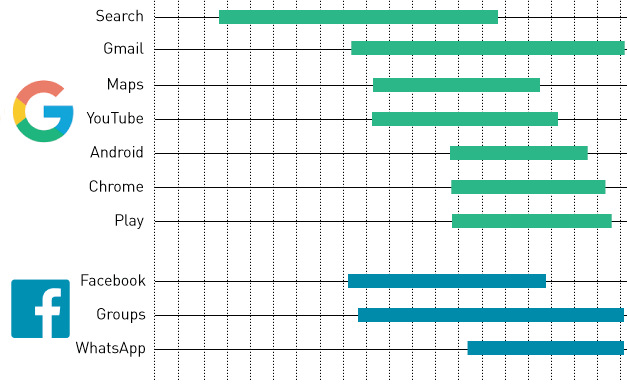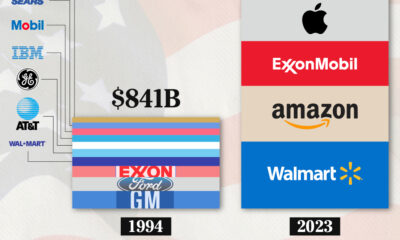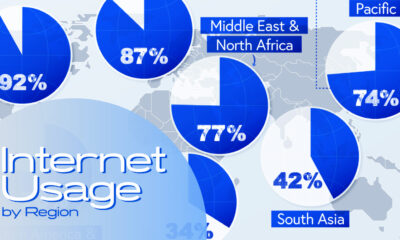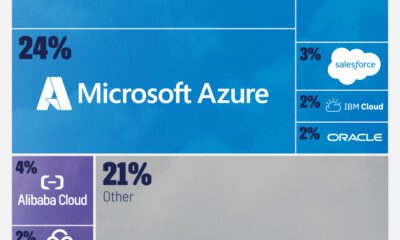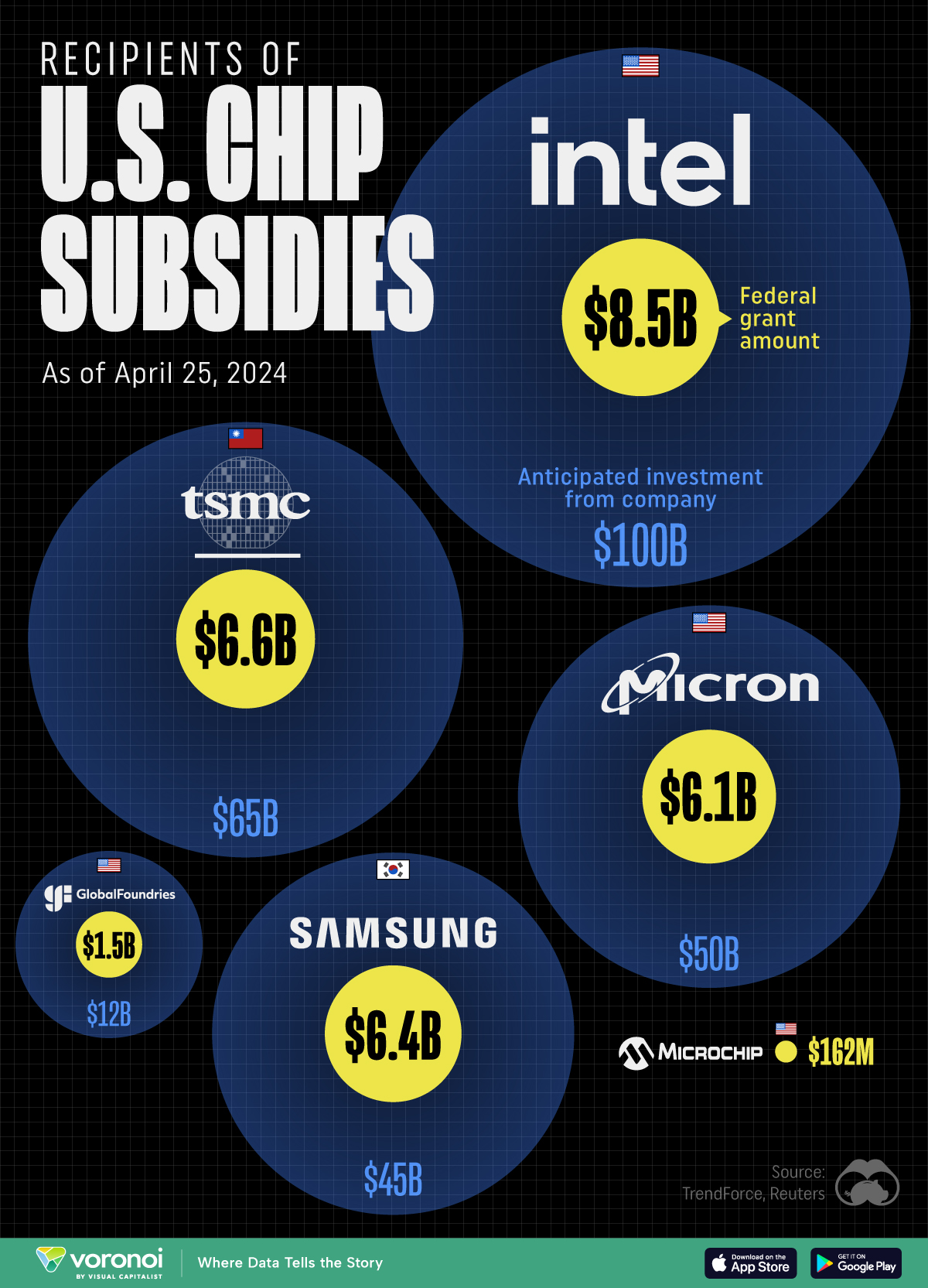Technology
Timeline: The March to a Billion Users [Chart]
![Timeline: The March to a Billion Users [Chart]](https://www.visualcapitalist.com/wp-content/uploads/2016/02/the-race-to-1-billion-users-chart.png)
The March to a Billion Users
How long did it take for each app to hit the 1B mark?
The Chart of the Week is a weekly Visual Capitalist feature on Fridays.
With approximately 3.3 billion people now using the internet, how hard can it possibly be to reach one billion of them each month?
It turns out that it’s quite a challenge.
Apple, the largest company by market capitalization, doesn’t have a single product with that kind of penetration.
WeChat, which is the most popular mobile messaging app in China, couldn’t reach one billion active users even if it was used by every single person with a smartphone in China. That’s why the app “only” has 650 million active users right now.
Meanwhile, names such as Reddit, Twitter, Pinterest, and Instagram all boast hundreds of millions of users. However, none of these are able to yet have the global market penetration to reach the coveted billion mark.
The Big Three
So far, the only companies in possession of apps or programs with more than one billion active users are Google, Facebook, and Microsoft.
Amazingly, Google alone has seven of them: Search, Gmail, Maps, YouTube, Android, Chrome, and Play. The last of these to reach the one billion mark was Gmail, as per Alphabet’s announcement earlier this month during an earnings call.
Google also has the app that reached one billion users the quickest: Android did it in only 5.8 years.
Facebook also has three apps that can make the billion user claim. Facebook itself has the largest audience out of all of these apps, with 1.59 billion monthly active users. WhatsApp, which Facebook bought for $22 billion in October 2014, has also recently announced on its blog that it also surpassed the one billion user mark. This now fulfills a promise that Mark Zuckerberg made to Facebook shareholders at the deal’s outset.
Lastly, there’s Microsoft’s Windows and Office products, which are the only paid products that could crack the list. They took the longest to get there: 25.8 years and 21.7 years respectively.
Technology
All of the Grants Given by the U.S. CHIPS Act
Intel, TSMC, and more have received billions in subsidies from the U.S. CHIPS Act in 2024.
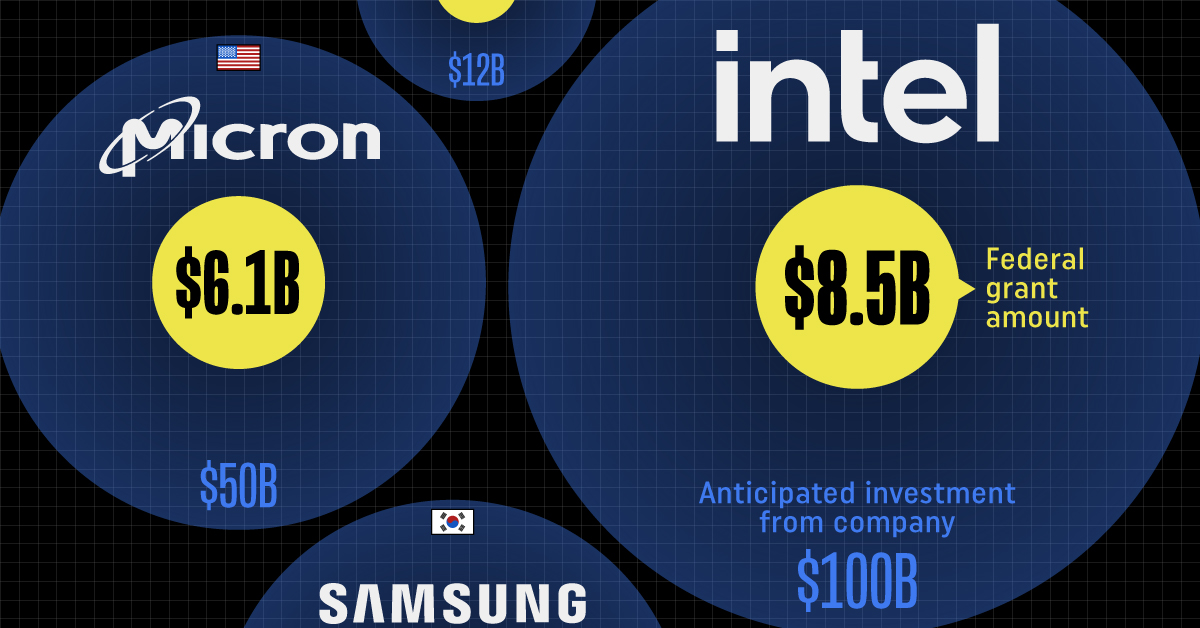
All of the Grants Given by the U.S. CHIPS Act
This was originally posted on our Voronoi app. Download the app for free on iOS or Android and discover incredible data-driven charts from a variety of trusted sources.
This visualization shows which companies are receiving grants from the U.S. CHIPS Act, as of April 25, 2024. The CHIPS Act is a federal statute signed into law by President Joe Biden that authorizes $280 billion in new funding to boost domestic research and manufacturing of semiconductors.
The grant amounts visualized in this graphic are intended to accelerate the production of semiconductor fabrication plants (fabs) across the United States.
Data and Company Highlights
The figures we used to create this graphic were collected from a variety of public news sources. The Semiconductor Industry Association (SIA) also maintains a tracker for CHIPS Act recipients, though at the time of writing it does not have the latest details for Micron.
| Company | Federal Grant Amount | Anticipated Investment From Company |
|---|---|---|
| 🇺🇸 Intel | $8,500,000,000 | $100,000,000,000 |
| 🇹🇼 TSMC | $6,600,000,000 | $65,000,000,000 |
| 🇰🇷 Samsung | $6,400,000,000 | $45,000,000,000 |
| 🇺🇸 Micron | $6,100,000,000 | $50,000,000,000 |
| 🇺🇸 GlobalFoundries | $1,500,000,000 | $12,000,000,000 |
| 🇺🇸 Microchip | $162,000,000 | N/A |
| 🇬🇧 BAE Systems | $35,000,000 | N/A |
BAE Systems was not included in the graphic due to size limitations
Intel’s Massive Plans
Intel is receiving the largest share of the pie, with $8.5 billion in grants (plus an additional $11 billion in government loans). This grant accounts for 22% of the CHIPS Act’s total subsidies for chip production.
From Intel’s side, the company is expected to invest $100 billion to construct new fabs in Arizona and Ohio, while modernizing and/or expanding existing fabs in Oregon and New Mexico. Intel could also claim another $25 billion in credits through the U.S. Treasury Department’s Investment Tax Credit.
TSMC Expands its U.S. Presence
TSMC, the world’s largest semiconductor foundry company, is receiving a hefty $6.6 billion to construct a new chip plant with three fabs in Arizona. The Taiwanese chipmaker is expected to invest $65 billion into the project.
The plant’s first fab will be up and running in the first half of 2025, leveraging 4 nm (nanometer) technology. According to TrendForce, the other fabs will produce chips on more advanced 3 nm and 2 nm processes.
The Latest Grant Goes to Micron
Micron, the only U.S.-based manufacturer of memory chips, is set to receive $6.1 billion in grants to support its plans of investing $50 billion through 2030. This investment will be used to construct new fabs in Idaho and New York.
-
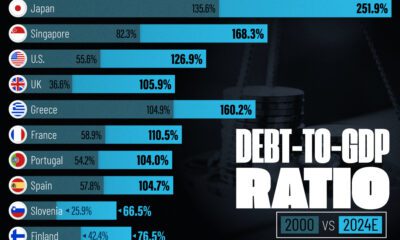
 Debt1 week ago
Debt1 week agoHow Debt-to-GDP Ratios Have Changed Since 2000
-

 Markets2 weeks ago
Markets2 weeks agoRanked: The World’s Top Flight Routes, by Revenue
-

 Countries2 weeks ago
Countries2 weeks agoPopulation Projections: The World’s 6 Largest Countries in 2075
-

 Markets2 weeks ago
Markets2 weeks agoThe Top 10 States by Real GDP Growth in 2023
-

 Demographics2 weeks ago
Demographics2 weeks agoThe Smallest Gender Wage Gaps in OECD Countries
-

 United States2 weeks ago
United States2 weeks agoWhere U.S. Inflation Hit the Hardest in March 2024
-

 Green2 weeks ago
Green2 weeks agoTop Countries By Forest Growth Since 2001
-

 United States2 weeks ago
United States2 weeks agoRanked: The Largest U.S. Corporations by Number of Employees

